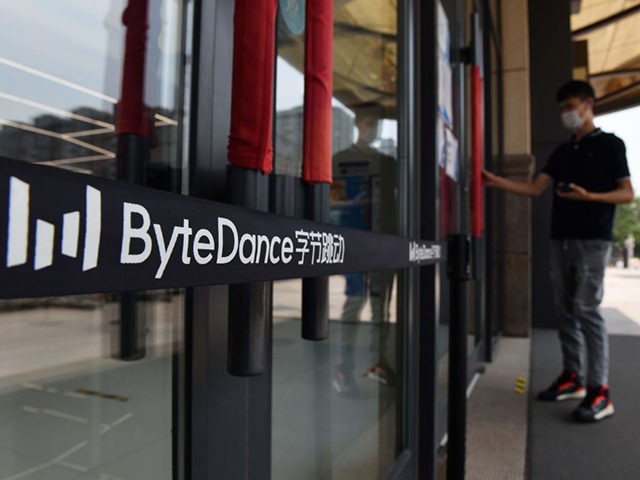The TikTok messaging platform has been frantically trying to convince the rest of the world — including boycott-minded Indians and possibly ban-minded American officials — that it is not a Chinese Communist Party (CCP) company, but rather a fully private and independent company that just happens to be headquartered in Beijing until it can find somewhere else to live.
The CCP did the company no favors on Wednesday by running a state media editorial brimming with nationalist pride for the popular “Chinese short-video sharing app.”
China’s state-run Global Times lauded TikTok’s popularity, referring to the platform and its owner, ByteDance, as “Chinese companies” several times, and amusingly insisting that American proposals to ban the app as a security threat are totally different from China’s bans on most American Big Tech companies.
This is not the first time that US politicians have issued threats to the Chinese short-video sharing app. The tech company is facing an increasingly difficult situation operating in the US. Some people may argue China also blocked US tech companies, such as Google, in the Chinese mainland. But this is a totally different scenario and is not comparable.
China requested US internet companies, including Google, to comply with Chinese laws and regulations, which are reasonable demands, if they want to operate in China. However, Google withdrew from China in 2010 and announced it was “no longer willing to continue censoring” results on the website.
TikTok, however, complies with US laws. The company has previously confirmed that data of US users is stored in the US, its data centers are located entirely outside of China, and does not send any user data back to China. In May, TikTok appointed American businessman and former Walt Disney Company top streaming executive Kevin Mayer as its CEO. Cautious and lawful as it is, TikTok is still facing huge uncertainty in the US. The US has become much too intolerant on China.
China welcomes these US companies to return to the Chinese mainland as long as they comply with China’s laws. In 2018, Google planned to return to the Chinese mainland by launching its Dragonfly search engine, but the company finally gave it up due to US political pressure. In addition, although China has never interfered in other countries’ choice of internet applications, Pompeo did encourage India’s ban on 59 Chinese apps, including TikTok.
Google terminated its Dragonfly browser project in 2019 because Americans asked some tough questions about why a company whose motto is “Don’t Be Evil” was creating a special browser that would make it easier for the authoritarian Chinese Communist regime to monitor and censor its own people. Dragonfly was supposed to be Google’s foot back in the door of the Chinese market after reservations about CCP censorship and its appalling human rights record drove the company away in 2010. This is not a helpful bit of history for the Global Times to dredge up if it wants readers to feel sympathy for TikTok’s plight.
TikTok’s PR department probably is not thrilled by any CCP effort to defend the company, since it has been trying very hard to convince the world that it is not really a “Chinese company” at all. In May, after former Disney exec Kevin Mayer became CEO, TikTok tried arguing that it is not really Chinese, even though it is headquartered in Beijing, because parent company ByteDance was incorporated in the Cayman Islands and has global investors.
TikTok knows that Beijing HQ is a problem, so it has been trying to set up a new global headquarters since the end of 2019. Singapore and London have been mentioned as possible locations, but not any city in the United States.
“That’s like dressing a panda in a business suit. It’s unlikely to fool anyone,” China First Capital chairman Peter Fuhrman opined at the time.
TikTok — which is a bit like Twitter, but with very short videos instead of very short written posts — has unquestionably been a huge success story, arguably the most popular application from China across foreign markets. Industry analysts say the TikTok user base grew by over 80 percent last year, to include some 625 million users worldwide.
TikTok faces criticism that it helps the CCP censor content from its users and their data. The U.S. Congress is calling for a thorough investigation of the relationship between TikTok, ByteDance, and the Chinese government. Some U.S. government and military agencies have already barred personnel from using TikTok, notably including the Transportation Security Agency (TSA) and the U.S. Army.
When he was recently asked if Americans should use TikTok, Secretary of State Mike Pompeo replied, “Only if you want your private information in the hands of the Chinese Communist Party.”
TikTok representatives insist their platform is secure, they have never given user data to the Chinese government, and all user information is kept in data centers beyond China’s borders. The same company provides a similar but supposedly distinct application called Douyin for Chinese audiences. TikTok is one of several social media platforms to announce it will pull out of the Hong Kong market, supposedly out of concern over the security law Beijing recently imposed on the city.
As a U.S. intelligence official reminded ABC News on Tuesday, TikTok and ByteDance might claim independence from the Chinese Communist Party, but Chinese law explicitly states they must provide all information stored on their networks to Chinese authorities upon request.
“All Americans should be concerned that their images, biometrics, locational and other data stored on Chinese apps must be turned over to China’s state security apparatus upon request,” the official cautioned.

COMMENTS
Please let us know if you're having issues with commenting.